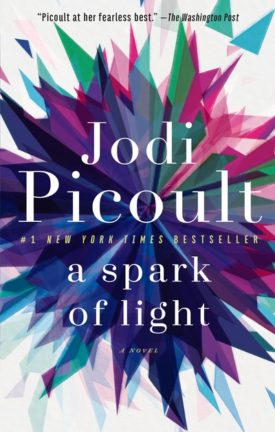 Synopsis:
Synopsis:
The setting is a women’s reproductive health services clinic where the staff offers services to anyone who comes through the door. But on this particular morning, a pro-life gunman enters. He opens fire, immediately killing some of the people inside the clinic, and taking the remainder hostage.
After rushing to the scene, Hugh McElroy, a police hostage negotiator, sets up a perimeter and begins making a plan to communicate with the gunman. As his phone vibrates with incoming text messages he glances at it and, to his horror, finds out that his fifteen-year-old daughter, Wren, is inside the clinic. But Wren did not go to the clinic along. She is with her aunt — Hugh’s sister.
Also inside with the gunman is a nurse who calms her own panic in order to save the life of a wounded woman; a doctor who works at the clinic because of his faith and will find that faith tested; a pro-life protester who entered disguised as a patient, but may now be a victim of the rage she has experienced herself; and a young woman who is there to terminate her pregnancy.
Employing a unique and imaginative narrative structure — the story unfolds backward through the hours of the standoff — bestselling, beloved author Jodi Picoult explores what brought each of an eclectic group of individuals to the clinic on a fateful day.
Never afraid to tackle a complicated issue, Picoult’s latest novel is sure to inspire debate, conversation . . . and, hopefully, understanding.
Review:
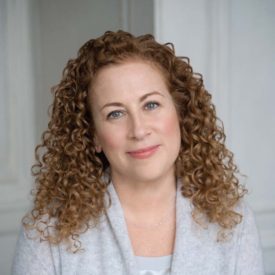
Throughout her career, but particularly in recent years, Jodi Picoult has proven herself a fearless author, willing to fictionalize any controversial topic. A Spark of Light may well be her most risky, ambitious, and successful endeavor to date. At last she tackles the issue of abortion.
Since 1977, 11 people have been killed in America as a result of violence targeted at abortion providers. Four of the victims were doctors, two were clinic employees; and one was a clinic escort. Additionally, a security guard, police officer, and two others have lost their lives. There have also been 17 attempted murders, 13 persons wounded, 42 bombings, and numerous other instances of violence or attempted violence.
Picoult’s story is set at the fictional Center — the only remaining clinic performing abortions in Mississippi. But the tale could be the headline on any morning in America. A gunman has stormed into the clinic and opened fire. Picoult utilizes an unusual and highly effective technique to relate the day’s events: They are set forth in reverse chronological order, hour by hour. Thus, the book opens at the point of the story’s dramatic climax, and then the events that led up to that moment are revealed in reverse order. As Picoult traces the action back through the day, showing how each individual came to be at the clinic, the characters’ secrets and motivations are revealed. Heart-breaking, jaw-droppingly ironic details are explored that demonstrate how beliefs, assumptions, demands, fears, and, indeed, bravery converged to fatefully deliver each person to the clinic on that particular day. Ancillary topics critical to the storyline include post-traumatic stress disorder caused by military service and, of course, gun control.
Two personal experiences inspired Picoult to write A Spark of Light. One of her college friends had an abortion when she was seven weeks pregnant — with Picoult’s full support. But years later, Picoult experienced a complication when she was seven weeks pregnant with her third child. Her doctor advised, “Either it’s going to stick or it’s not.” Picoult recounts how devastated she was because, at seven weeks, her child was, to her, already her baby. And that caused her to question her dual beliefs. That supporting her friend’s decision to abort was correct, even though she felt such a strong connection to the child she was carrying. “And to me,” she observes, “laws are black and white, but the lives of women are 1,000 shades of grey and when we rely on laws to legislate reproductive rights, we’re always going to wind up tangled and lacking and that was why I wanted to write this book.”
To pen the novel, Picoult conducted extensive research. She interviewed pro-life advocates who spoke “from a place of deep personal conviction” that life is precious and the decision to terminate a pregnancy impacts an innocent and voiceless human being. She also interviewed 151 women who had terminated a pregnancy, many of whom sought to convey that they were not bad people. One stated, “I don’t need people shaming me because of a choice that already hurt my heart to have to make.” Additionally, Picoult spoke with staff members at clinics and observed abortions as they were performed.
In her signature style, Picoult challenges readers, through the thoughts, beliefs, and actions of her characters, to ponder the most difficult questions. How should a pregnant woman’s rights to autonomy and privacy be balanced against the rights of her unborn child? Can laws imposing absolute boundaries ever be workable? How do one’s past experiences and upbringing undergird and inform one’s opinions on the subject? And given the wide range of beliefs, values, and experiences Americans hold, is there any possible way that, as a society, consensus can ever be achieved?
“Laws are black and white, but the lives of women are 1,000 shades of grey.” ~ Author Jodi Picoult
A Spark of Light is a compelling, demanding, and thought-provoking story that provokes a deeply visceral reaction. The subject matter and story are timely, controversial, and provocative. And deeply disturbing. In the hands of a less-skilled writer, the story could have become mired in preachy, judgmental rhetoric. But Picoult makes clear that she has no desire to tell her readers what to think. Rather, she approaches the topic with sensitivity, and compassion and respect for all of her characters, regardless of which side of the debate they are on. Thus, she manages to tell the story in a balanced, understanding fashion. Picoult exquisitely portrays the fragility of her characters and the monumental impact of beliefs and actions upon their own lives, as well as upon the lives of their loved ones, in a straight-forward manner that makes the impact even more heart-breaking.
Why did she title the book A Spark of Light? Scientists recorded a zinc flash at the moment a sperm fertilizes an egg. And noted that certain eggs glowed a bit brighter than others at the moment of conception — “the same ones that went on to become healthy embryos.” The team at Northwestern University studying in vitro fertilization determined that the correct embryos to transfer were the ones that burned the brightest at the moment of fertilization. Thus, “[t]hose infinitesimal bits of zinc determined whether an egg would become a completely new genetic entity.” As Louie, the physician in A Spark of Light who works at the Center as a matter of faith, observes, people who are dying often speak about seeing a tunnel with a glowing light at the other end. They talk about going toward the light. So to him, it stands “to reason that both life and death begin with a spark of light.” Hence Picoult’s title.
For fans of Picoult’s work, as well as those who have never read her previous novels, A Spark of Light is a book that simply must be read by anyone seeking to gain a deeper understanding and appreciation of the competing viewpoints on abortion, and why those on opposite sides of the issue must strive to find a way to peacefully co-exist. Picoult candidly doubts that, as a society, there will ever be agreement but “the first step is to talk to each other and more important, to listen . . . Perhaps in those honest conversations, instead of demonizing each other, we might see each other as imperfect humans, doing our best.” A conversation among friends who have formed a book club and collectively read A Spark of Light would be an excellent setting in which to start such a discussion.
Excerpt from A Spark of Light
The Center squatted on the corner of Juniper and Montfort behind a wrought-iron gate, like an old bulldog used to guarding its territory. At one point, there had been many like it in Mississippi— nondescript, unassuming buildings where services were provided and needs were met. Then came the restrictions that were designed to make these places go away: The halls had to be wide enough to accommodate two passing gurneys; any clinic where that wasn’t the case had to shut down or spend thousands on reconstruction. The doctors had to have admitting privileges at local hospitals—even though most were from out of state and couldn’t secure them—or the clinics where they practiced risked closing, too. One by one the clinics shuttered their windows and boarded up their doors. Now, the Center was a unicorn—a small rectangle of a structure painted a fluorescent, flagrant orange, like a flag to those who had traveled hundreds of miles to find it. It was the color of safety; the color of warning. It said: I’m here if you need me. It said, Do what you want to me; I’m not going.
The Center had suffered scars from the cuts of politicians and the barbs of protesters. It had licked its wounds and healed. At one point it had been called the Center for Women and Reproductive Health. But there were those who believed if you do not name a thing, it ceases to exist, and so its title was amputated, like a war injury. But still, it survived. First it became the Center for Women. And then, just: the Center.
The label fit. The Center was the calm in the middle of a storm of ideology. It was the sun of a universe of women who had run out of time and had run out of choices, who needed a beacon to look up to.
And like other things that shine so hot, it had a magnetic pull. Those in need found it the lodestone for their navigation. Those who despised it could not look away.
Today, Wren McElroy thought, was not a good day to die. She knew that other fifteen-year-old girls romanticized the idea of dying for love, but Wren had read Romeo and Juliet last year in eighth-grade English and didn’t see the magic in waking up in a crypt beside your boyfriend, and then plunging his dagger into your own ribs. And Twilight—forget it. She had listened to teachers paint the stories of heroes whose tragic deaths somehow enlarged their lives rather than shrinking them. When Wren was six, her grandmother had died in her sleep. Strangers had said over and over that dying in your sleep was a blessing, but as she stared at her nana, waxen white in the open coffin, she didn’t understand why it was a gift. What if her grandmother had gone to bed the night before thinking, In the morning, I’ll water that orchid. In the morning, I’ll read the rest of that novel. I’ll call my son. So much left unfinished. No, there was just no way dying could be spun into a good thing.
Her grandmother was the only dead person Wren had ever seen, until two hours ago. Now, she could tell you what dying looked like, as opposed to just dead. One minute, Olive had been there, staring so fierce at Wren—as if she could hold on to the world if her eyes stayed open—and then, in a beat, those eyes stopped being windows and became mirrors, and Wren saw only a reflection of her own panic.
She didn’t want to look at Olive anymore, but she did. The dead woman was lying down like she was taking a nap, a couch cushion under her head. Olive’s shirt was soaked with blood, but had ridden up on the side, revealing her ribs and waist. Her skin was pale on top and then lavender, with a thin line of deep violet where her back met the floor. Wren realized that was because Olive’s blood was settling inside, just two hours after she’d passed. For a second, Wren thought she was going to throw up.
She didn’t want to die like Olive, either.?Which, given the circumstances, made Wren a horrible person. The odds were highly unlikely, but if Wren had to choose, she would die in a black hole. It would be instant and it would be epic. Like, literally, you’d be ripped apart at the atomic level. You’d become stardust.
Wren’s father had taught her that. He bought her her first telescope, when she was five. He was the reason she’d wanted to be an astronaut when she was little, and an astrophysicist as soon as she learned what one was. He himself had had dreams of commanding a space shuttle that explored every corner of the universe, until he got a girl pregnant. Instead of going to grad school, he had married Wren’s mom and become a cop and then a detective and had explored every corner of Jackson, Mississippi, instead. He told Wren that working for NASA was the best thing that never happened to him.
When they were driving back from her grandmother’s funeral, it had snowed. Wren—a child who’d never seen weather like that in Mississippi before—had been terrified by the way the world swirled, unmoored. Her father had started talking to her: Mission Specialist McElroy, activate the thrusters. When she wouldn’t stop crying, he began punching random buttons: the air-conditioning, the four-way flashers, the cruise control. They lit up red and blue like a command center at Mission Control. Misison Specialist McElroy, her father said, prepare for hyperspace. Then he flicked on his brights, so that the snow became a tunnel of speeding stars, and Wren was so amazed she forgot to be scared.
She wished she could flick a switch now, and travel back in time. She wished she had told her dad she was coming here.?She wished she had let him talk her out of it.?She wished she hadn’t asked her aunt to bring her.
Aunt Bex might even now be lying in a morgue, like Olive, her body becoming a rainbow. And it was all Wren’s fault.
You, said the man with a gun, his voice dragging Wren back to the here and now. He had a name, but she didn’t want to even think of it. It made him human and he wasn’t human; he was a monster. While she’d been lost in thought, he’d come to stand in front of her. Now, he jerked the pistol at her. Get up.
The others held their breath with her. They had, in the past few hours, become a single organism. Wren’s thoughts moved in and out of the other women’s minds. Her fear stank on their skin.
Blood still bloomed from the bandage the man had wrapped around his hand. It was the tiniest of triumphs. It was the reason Wren could stand up, even though her legs were jelly.
She shouldn’t have come to the Center.?She should have stayed a little girl.?Because now she might not live to become anything else.?Wren heard the hammer click and closed her eyes. All she could picture was her father’s face—the blue-jean eyes, the gentle bend of his smile—as he looked up at the night sky.
When George Goddard was five years old, his mama tried to set his daddy on fire. His father had been passed out on the couch when his mother poured the lighter fluid over his dirty laundry, lit a match, and dumped the flaming bin on top of him. The big man reared up, screaming, batting at the flames with his ham hands. George’s mama stood a distance away with a glass of water. Mabel, his daddy screamed. Mabel! But his mama calmly drank every last drop, sparing none to extinguish the flames. When George’s father ran out of the house to roll in the dirt like a hog, his mama turned to him. Let that be a lesson to you, she said.
He had not wanted to grow up like his daddy, but in the way that an apple seed can’t help but become an apple tree, he had not become the best of husbands. He knew that now. It was why he had resolved to be the best of fathers. It was why, this morning, he had driven all this way to the Center, the last standing abortion clinic in the state of Mississippi.
What they’d taken away from his daughter she would never get back, whether she realized it now or not. But that didn’t mean he couldn’t exact a price.
He looked around the waiting room. Three women were huddled on a line of seats, and at their feet was the nurse, who was checking the bandage of the doctor. George scoffed. Doctor, my ass. What he did wasn’t healing, not by any stretch of the imagination. He should have killed the guy—would have killed the guy—if he hadn’t been interrupted when he first arrived and started firing.
He thought about his daughter sitting in one of those chairs. He wondered how she’d gotten here. If she had taken a bus. If a friend had driven her or (he could not even stand to think of it) the boy who’d gotten her in trouble. He imagined himself in an alternate universe, bursting through the door with his gun, seeing her in the chair next to the pamphlets about how to recognize an STD. He would have grabbed her hand and pulled her out of there.
What would she think of him, now that he was a killer??How could he go back to her??How could he go back, period??Eight hours ago this had seemed like a holy crusade—an eye for an eye, a life for a life.
His wound had a heartbeat. George tried to adjust the binding of the gauze around it with his teeth, but it was unraveling. It should have been tied off better, but who here was going to help him?
The last time he had felt like this, like the walls were closing in on him, he had taken his infant daughter—red and screaming with a fever he didn’t know she had and wouldn’t have known how to treat— and gone looking for help. He had driven until his truck ran out of gas—it was past one a.m., but he started walking—and continued until he found the only building with a light on inside, and an unlocked door. It was flat-roofed and unremarkable—he hadn’t known it was a church until he stepped inside and saw the benches and the wooden relief of Jesus on the cross. The lights he had seen outside were candles, flickering on an altar. Come back, he had said out loud to his wife, who was probably halfway across the country by now. Maybe he was tired, maybe he was delusional, but he very clearly heard a reply: I’m already with you. The voice whispered from the wooden Jesus and at the same time from the darkness all around him.
George’s conversion had been that simple, and that enveloping. Somehow, he and his girl had fallen asleep on the carpeted floor. In the morning, Pastor Mike was shaking him awake. The pastor’s wife was cooing at his baby. There was a groaning table of food, and a miraculously spare room. Back then, George hadn’t been a religious man. It wasn’t Jesus that entered his heart that day. It was hope.
Hugh McElroy, the hostage negotiator George had been talking to for hours, said George’s daughter would know he had been trying to protect her. He’d promised that if George cooperated, this could still end well, even though George knew that outside this building were men with rifles trained on the door just waiting for him to emerge.
George wanted this to be over. Really, he did. He was exhausted mentally and physically and it was hard to figure out an endgame. He was sick of the crying. He wanted to skip ahead to the part where he was sitting by his daughter again, and she was looking up at him with wonder, the way she used to.
But George also knew Hugh would say anything to get him to surrender to the police. It wasn’t even just his job. Hugh McElroy needed him to release the hostages for the same reason that George had taken them in the first place—to save the day.
That’s when George figured out what he was going to do. He pulled back the hammer on the gun. “Get up. You,” he said, pointing to the girl with the name of a bird, the one who had stabbed him. The one he would use to teach Hugh McElroy a lesson.
Excerpted from A Spark of Light copyright © 2018 Jodi Picoult. All rights reserved. No part of this excerpt may be reproduced or reprinted without permission in writing from Random House Publishing Group.
Also by Jodi Picoult:
Enter to Win a Copy of A Spark of Light
Note: The book may only be mailed to a United States address.

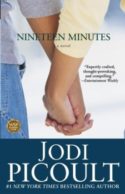
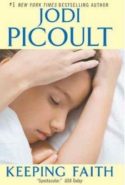
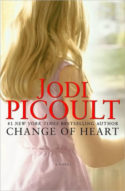

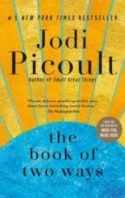
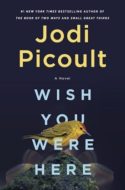




11 Comments
I have never read one of Picoult’s books, but this one intrigues me because of the focus on women’s reproductive health.
I have read The Storyteller which was captivating and memorable. A spark of Life sounds very intense and complex.
I’ve read Jodie’s books in the past – but can’t remember the titles at the moment. She has a wonderful writer’s voice and intriguing characters!
Sounds interesting. New author for me.
I have read several of her books, all of which were very good. And I have a stack more that I haven’t gotten to yet (but not this one!)
Have never read her yet, time to start
I love Picoult’s books. Would love to add this one.
I have not read any of her books, but I hope to in the near future. She seems to tackle hard topics that need to be explored. I’d be delighted to start reading her books with this one. Thanks for the chance.
I have read so many of Jodi Picoult’s books, and I don’t think I can pick a favorite because I enjoyed them all. I love how her stories touch on difficult, but realistic situations and make you think.
This would be my first read by her, the book sounds terrific. Thanks for your great generosity.
I own almost all of Jodi’s books except the recent ones. I can’t pick a favorite.